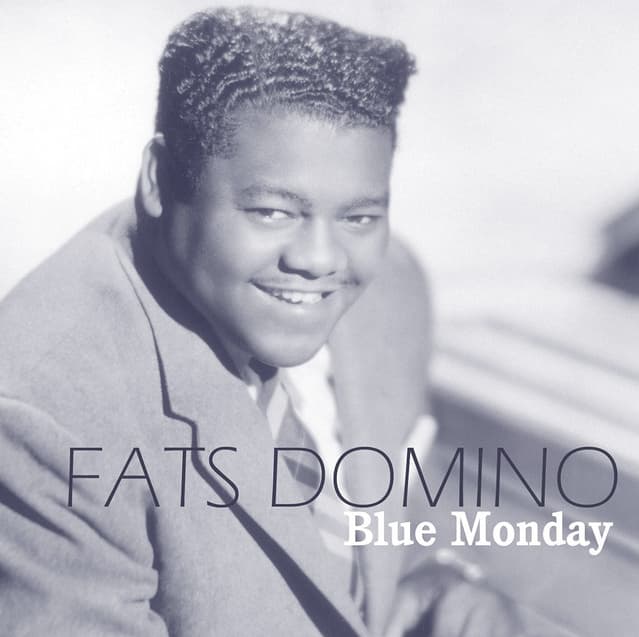
Fats Domino – “Blue Monday”: A Bluesy Anthem of Working-Class Struggle and Weekend Relief
Fats Domino’s “Blue Monday” is a classic rock and roll tune with a bluesy edge that captures the grind of the workweek and the sweet escape of the weekend. Released in 1956, the song became one of Domino’s many hits, reaching No. 5 on the Billboard R&B chart and later crossing over to the pop charts. Written by Dave Bartholomew and popularized by Domino’s soulful, rolling piano and warm vocal delivery, “Blue Monday” speaks to the universal experience of the working class, caught between the demands of the daily grind and the brief respite offered by Saturdays and Sundays.
The song opens with Domino’s signature piano style, an infectious, rollicking rhythm that sets a steady, bluesy tone. The beat is simple yet powerful, perfectly capturing the repetitive nature of the workweek. The piano, accompanied by a bass line and subtle drums, creates a groove that feels both weary and lively—a nod to the resilience of those who work hard and play hard. Domino’s piano playing is unmistakable, with each note carrying a smooth, relaxed quality that makes listeners feel like they’re sitting right alongside him.
Lyrically, “Blue Monday” follows the progression of a typical workweek, detailing the dread of Monday and the exhaustion that builds as the week drags on. Lines like “Blue Monday, how I hate Blue Monday” and “Got to work like a slave all day” convey the frustration and fatigue that many listeners can relate to. Domino’s delivery of these lines is both resigned and relatable, capturing the universal experience of feeling drained by the demands of a job. The lyrics highlight the repetitive, sometimes discouraging cycle of work, contrasting it with the anticipation of the weekend’s brief reprieve.
The chorus, “Sunday morning my head is bad, but it’s worth it for the times that I had,” reflects the narrator’s appreciation for the joy and release of weekend fun, even if it comes with a hangover and the impending return to Monday. This line captures the bittersweet reality of working-class life, where moments of pleasure are often overshadowed by the necessity of returning to work. The song’s structure, with its repetitive verse-chorus progression, mirrors the cyclical nature of the workweek, adding to the song’s sense of routine and repetition.
Domino’s vocal performance is key to the song’s appeal, blending warmth, soul, and a touch of resignation. His voice is smooth yet rich with feeling, adding depth to the lyrics. Domino’s vocal style is relaxed but expressive, conveying both the fatigue of the workweek and the brief happiness found on the weekend. His delivery of each line feels sincere and personal, as though he’s singing from his own experience. This authenticity is one of the reasons “Blue Monday” has remained a classic, resonating with listeners who see their own lives reflected in its lyrics.
Musically, “Blue Monday” is a blend of rock and roll and rhythm and blues, combining Domino’s New Orleans-style piano with a steady beat that makes it easy to tap along. The song’s straightforward instrumentation and production allow Domino’s piano and vocals to take center stage, emphasizing the song’s message without unnecessary embellishments. The steady beat and repetitive rhythm reinforce the theme of routine and hard work, making it feel like a song that’s grounded in real life.
“Blue Monday” was a standout track in Domino’s catalog, capturing a slice of working-class life that resonated with audiences across racial and economic divides. Its relatable lyrics, combined with Domino’s signature sound, helped it cross over into the mainstream, making it a favorite on both R&B and pop charts. The song’s success contributed to Domino’s reputation as one of the pioneers of rock and roll, a musician who could convey complex emotions with simplicity and soul.
Over time, “Blue Monday” has become a beloved classic, a song that speaks to the hard work, resilience, and small joys of working people everywhere. Its themes are timeless, reflecting the universal experience of balancing work with the need for enjoyment and relaxation. Whether listened to on a Monday morning or a Saturday night, “Blue Monday” captures the essence of life’s ups and downs, reminding listeners that even the toughest weeks come to an end.
In the end, “Blue Monday” is more than just a song about the workweek—it’s a testament to the perseverance and spirit of everyday people. Fats Domino’s warm vocals, distinctive piano style, and relatable lyrics make it a track that continues to resonate with listeners of all ages. For fans of rock and roll, rhythm and blues, and music that speaks to the soul, “Blue Monday” remains a timeless anthem that celebrates the resilience and optimism of the working class.